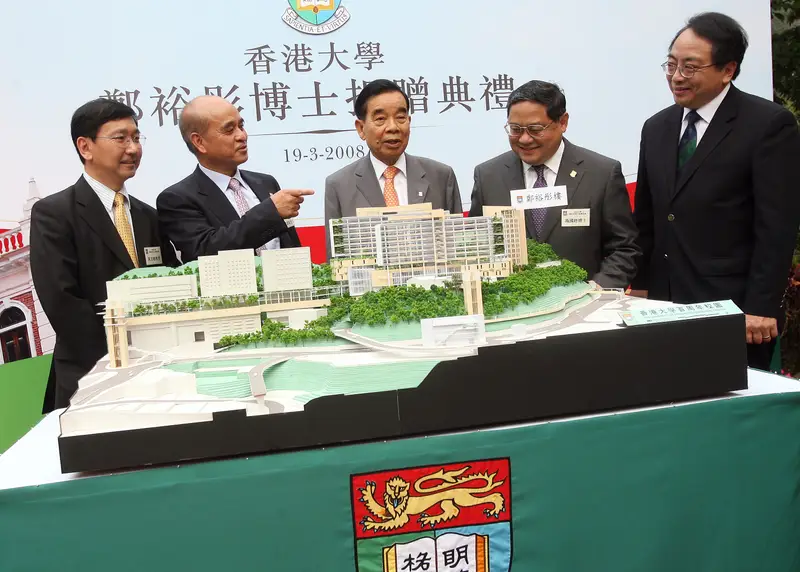Estimated Net Worth: $24–26 Billion
Region: Hong Kong, China
Core Industries: Real estate, jewelry, hospitality, infrastructure
The Cheng family, led by the late Cheng Yu-tung, has long been one of Hong Kong’s most influential business dynasties. With diversified holdings in real estate, retail, hospitality, and infrastructure, the family has maintained a firm position near the top of Asia’s wealth rankings for decades.
The family’s wealth traces back to Cheng Yu-tung, a self-made businessman whose early involvement in jewelry retail eventually evolved into a sprawling empire now known through flagship entities such as Chow Tai Fook Jewellery Group and New World Development Company Limited.

Early Life and Rise to Prominence
Born in 1925 in Shunde, Guangdong province, Cheng Yu-tung migrated to Macau in his youth and eventually settled in Hong Kong. His initial foray into business was through Chow Tai Fook, a jewelry retailer founded by his father-in-law. Under Cheng’s stewardship, the company expanded aggressively during the postwar boom years, capitalizing on rising consumer demand and Hong Kong’s emergence as a key trade and financial center in Asia.
By the 1970s, Cheng had diversified the family’s business interests, founding New World Development in 1970. The company quickly became a dominant player in real estate, building commercial towers, residential complexes, and hotels throughout Hong Kong and mainland China.
Business Footprint
Today, the Cheng family’s holdings include a mix of public and private assets across various sectors:
Chow Tai Fook Jewellery Group
- One of the world’s largest jewelry retailers by revenue and number of outlets.
- Operates over 7,000 points of sale across Asia, with a growing presence in mainland China.
- Listed on the Hong Kong Stock Exchange in 2011.
New World Development Company Limited
- Publicly listed property developer with assets in Hong Kong and mainland China.
- Owns and operates major commercial properties, residential developments, and infrastructure projects.
- Developer of Victoria Dockside, one of Hong Kong’s most high-profile waterfront developments.
Rosewood Hotel Group
- A global luxury hotel brand acquired by the Cheng family in 2011 through New World Hospitality.
- Now includes properties in North America, Europe, Asia, and the Middle East.
- Flagship hotel, Rosewood Hong Kong, opened in 2019 as part of the family’s Victoria Dockside project.
Infrastructure and Energy
- The family has also invested in utilities, transport, and energy-related assets, often through various private vehicles or public-private partnerships.
Succession and Family Management
Following the death of Cheng Yu-tung in 2016 at the age of 91, leadership of the family business passed to his eldest son, Henry Cheng Kar-shun, who currently serves as chairman of both New World Development and Chow Tai Fook Jewellery. Henry has continued the strategy of steady growth through regional expansion and asset diversification.
Members of the third generation, including Henry’s children Adrian Cheng and Sonia Cheng, now play increasingly visible roles in the business.
- Adrian Cheng, known for his cultural and tech-forward approach to real estate, is CEO and Executive Vice Chairman of New World Development and founder of K11, a retail-art hybrid concept that bridges commerce and culture.
- Sonia Cheng serves as CEO of Rosewood Hotel Group, overseeing the expansion of the company’s global hospitality footprint.
This gradual transition underscores the family’s emphasis on continuity, generational planning, and sustained brand value.
Philanthropy and Public Role
The Cheng family has also made significant philanthropic contributions to health care, education, and the arts—particularly in Hong Kong. In 2015, the family pledged HK$100 million (approximately USD $13 million) to the University of Hong Kong, and they have supported various museums and community programs.
Notably, Adrian Cheng has positioned himself as a patron of emerging art and design talent in Asia through the K11 Art Foundation, helping to bridge traditional wealth with modern cultural impact.
A Family Office in Action
The scale of the Cheng family’s wealth and holdings suggests a highly coordinated family office structure, though most operations remain tied to the group’s public entities. The family controls its major holdings through a network of companies under the umbrella of Chow Tai Fook Capital, the private investment arm managing both active businesses and passive financial assets.
By blending public market participation with family-led private control, the Chengs have maintained influence without relinquishing flexibility—a common feature among modern dynasties seeking both capital access and operational independence.

Outlook
The Cheng family’s businesses continue to grow steadily, particularly in mainland China where jewelry consumption, urban development, and luxury hospitality remain on upward trajectories. As Hong Kong navigates its changing political and economic landscape, the Chengs—rooted in traditional values but managed with forward-looking strategies—are likely to remain one of Asia’s most stable dynastic forces.
Their influence now spans beyond commerce into culture, architecture, and soft power diplomacy, making them one of the few families in Asia whose presence is felt both in boardrooms and public spaces alike.
Summary Table
| Entity | Sector | Notable Details |
|---|---|---|
| Chow Tai Fook Jewellery | Retail | 7,000+ outlets, listed in HK |
| New World Development | Real Estate | Developer of Victoria Dockside |
| Rosewood Hotel Group | Hospitality | 30+ hotels globally; luxury repositioning project |
| K11 | Retail + Art | Founded by Adrian Cheng; hybrid model |
| Chow Tai Fook Capital | Family Office | Oversees private holdings and investments |
Final Remarks
The Cheng Yu-tung family is a prime example of East Asian dynastic wealth structured for long-term influence. From a single jewelry shop to a multi-billion-dollar empire, their model reflects a blend of patriarchal succession, professional governance, and generational adaptability.
In a global era of tech disruption and shifting wealth, the Chengs remind us that some fortunes are not built in decades—but sustained across them.
